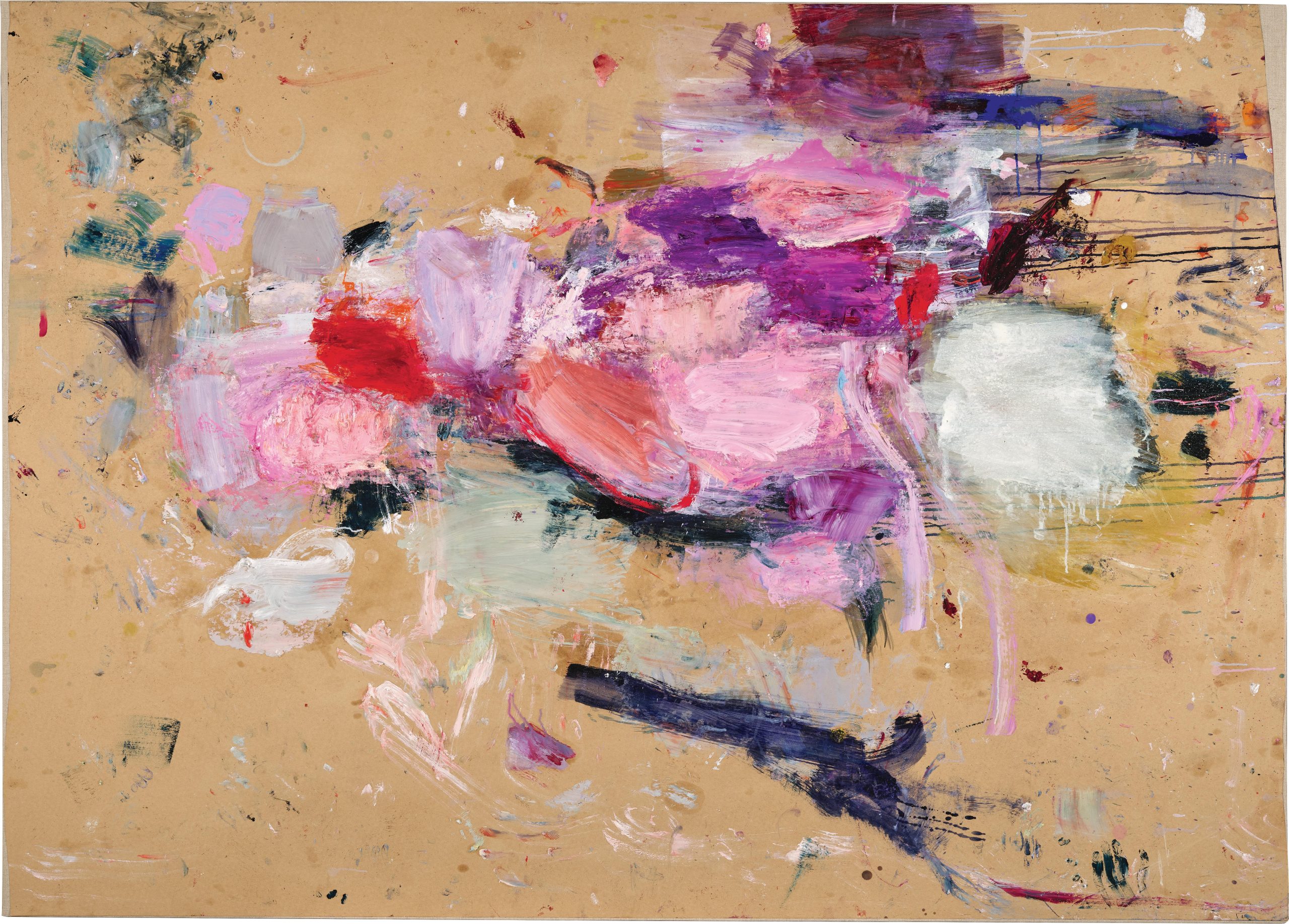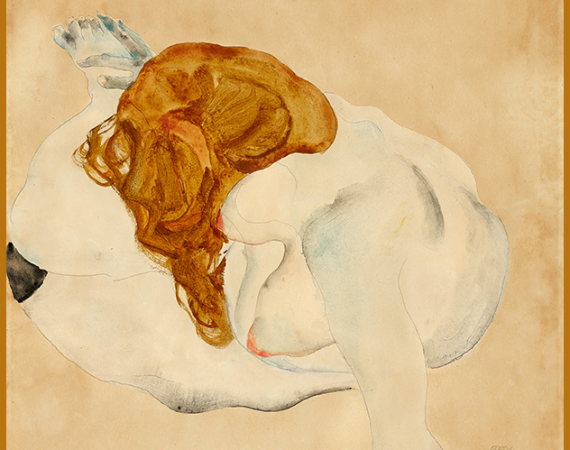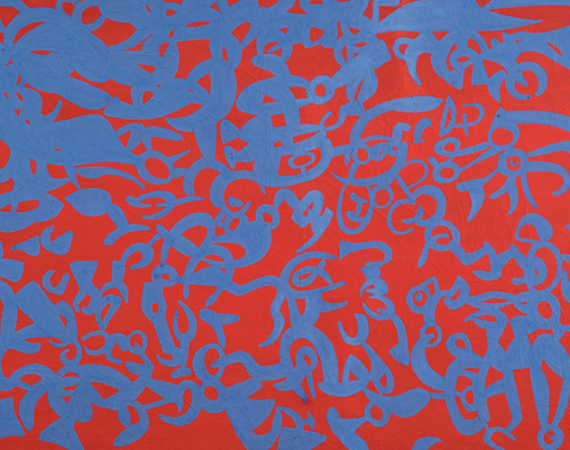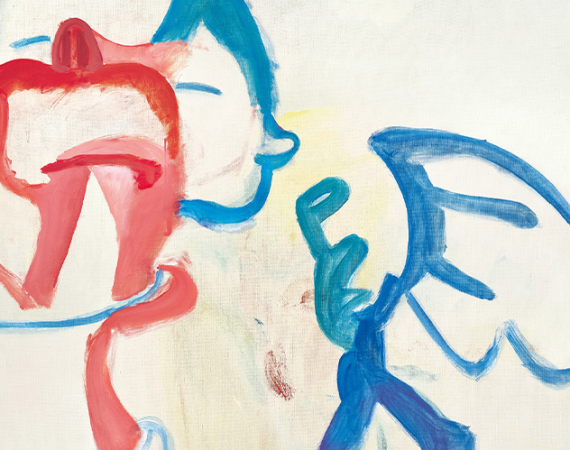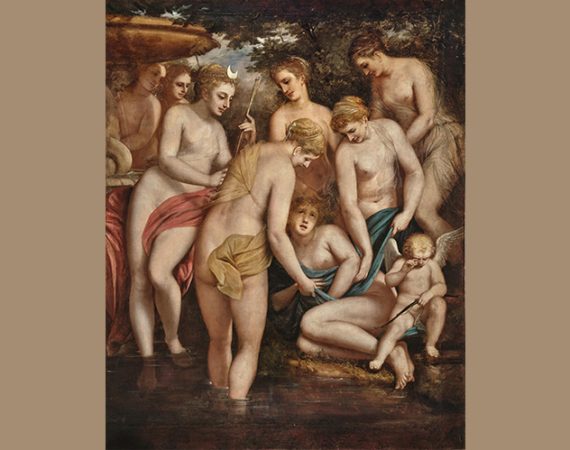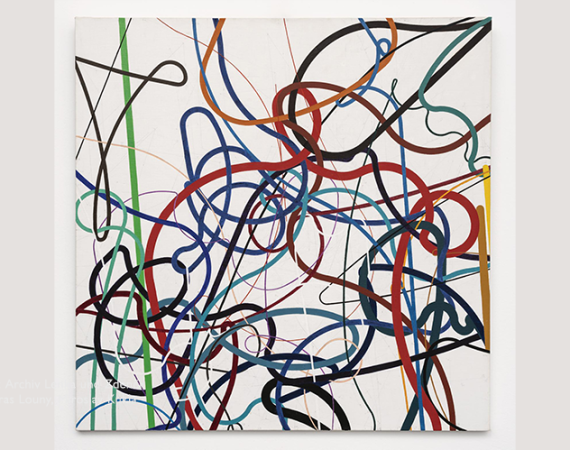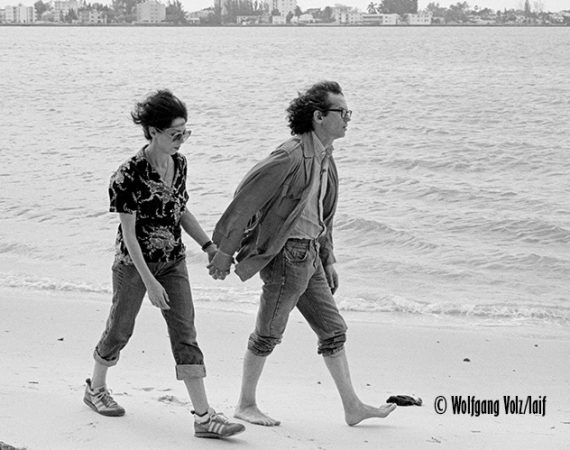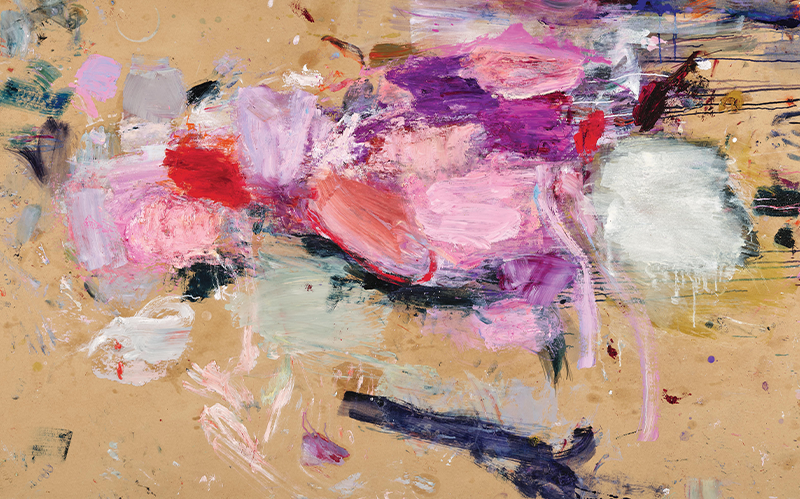
What do art and clubbing have in common? They open doors to a world beyond the drab monotony of everyday life. For the literary series of Dorotheum myART MAGAZINE writer Eva Reisinger draws inspiration from the concentrated energy of Martha Jungwirth’s untitled artwork, turning night into day in her short story.

It’s 2.15 am and the night is just getting started. E could go to bed. That would be the smart thing to do. A responsible, adult decision, some might say. E is 35 and already far too mature far too often. She defrosts her fridge even though the door closes just fine. When brown wings of moths flit through her kitchen, she hunts down their nest until she finds it. She no longer washes all her clothes together, but separates light and dark, sometimes even groups them by temperature. She has a husband, a dog, a child and
far too little time for herself. Every time she smokes a cigarette, she thinks this one really has to be the last. When the neighbours cracked open another bottle of rosé prosecco, she cautioned herself: just one more glass. You’re always punishing yourself – such a Cat- holic thing, J always says whenever E announces that she’s going home after this drink. But E isn’t even that Catholic. Well, more Catholic than J, anyway, because J is Protestant. Sometimes E worries that although she officially de-registered herself as a Catholic years ago – despite the fact that whenever she steps into a church building she keeps her hands buried firmly in her pockets to resist the automatic urge to dip herself in holy water and make the sign of the cross – it’s the guilt that lingers, of all things. Because she
doesn’t need it in her life. She thinks far too much about everything as it is.
E scrolls back through her messages to see if the blue tick has appeared yet. Her fingertips tingle, her stomach churns. She’s not sure if it’s nausea or anticipation. She wants to call a taxi. She wants to relax. She wants to start the night over and be someone else. J had texted hours ago, saying she wanted to go out tonight for sure.
Yes, yes, yes, thought E. Going out sounds good. But catching up on sleep, that also sounds like a plan.
At midnight, J had asked:
– how’s it looking?
– I’m still having a drink with the neighbours
– and after?
– Dancing would be nice!
Had it not been J, E would have gone to bed. She’d know by now that the other person wasn’t going anywhere. No blue tick, no reply. If someone doesn’t answer immediately at this time of night, you can’t count on them. Hesitate at night and you lose. Had it not been
J, E would go to sleep, and tomorrow they’d reassure each other that it just didn’t work out. What a shame. Next time, for sure! But behind those lame messages, they’d both know it wasn’t going to happen. At least not at this stage of life. Everyone has dogs, chil-
dren, or both. Everyone works out. No one goes out spontaneously at night anymore. The night hasn’t stood a chance in years. At night, everyone just wants to sleep. Morning is the new superstar. Even E has long since given up on the night, no longer fighting against packed schedules and the healthy lifestyles everyone suddenly seems to be embracing.
J always says this could be the last night. And when she says it, it’s not melodramatic. When she says it, E believes her. Because it really could be the last time. If J says it, then it’s true. She would know. E takes another sip of chilled prosecco and lights what will surely be her last cigarette. The ember glows like a firefly in the night as E takes a deep breath. One great, fine thing about getting older, E thinks, is that at least the wine isn’t body temperature anymore. No one dares to turn up with a warm bottle of Sonnleiten or Storch anymore. E crosses her legs, even though she knows it’ll give her back pain. Sitting still is getting harder and harder. She doesn’t want to drink any more rosé prosecco. She wants to dance. She wants to turn off her mind. She doesn’t want to think about the child in the flat across the hall. She doesn’t want to hear it breathing all the time, to feel the kid’s tiny fingers reaching for her. She doesn’t want to smell its sweet, sweaty scent, or feel soft, small hands on her face. For a few hours, she wants to be someone else. Someone she knows well. Someone she herself used to be, not so many years ago.
Ping. Finally. E stubs out her cigarette and grins at her lock screen. Ping again. Her neighbours look bewildered as E stands up and starts saying her goodbyes. She really has to get to bed, she says, it’s gotten so late. Everyone nods. As she shakes hands and hugs people, she thinks of that dot on the map on her phone, now moving towards the club. J had responded by sharing her location. It was exactly the answer E was hoping for. One always needs at least a few people in life who just show up. No excuses, no logical decisions. They come.
In the lift, E listens to the opening notes of her favourite song. The 1980s flood into her ears. E doesn’t normally listen to this kind of thing. She likes pop and classical and most definitely not German soft rock. When the song first came on in the club, E looked at J in disbelief. J listens to indie. Indie and good music. In the taxi, E presses her hands firmly against her legs, trying to calm them. By now her whole body is tingling. Arriving at the club, she looks around. What if she’s stranded here, alone, in the middle of the night? No, she wouldn’t go in alone. She’d be too embarrassed, stuck between the freshers and the Erasmus kids.
But when J comes running across the street, all doubts melt away. As her friend lifts her up, E knows that for the next few hours they can both be someone else. Someone unburdened by the weights in their lives. They’ll forget, just for a while, that in the last several weeks people around them have died, fallen ill, tried to take their own lives, or now exist only in memory. They’ll be in their early 20s again. They’ll laugh at men. They’ll watch them dance with confidence onstage in flip-flops and Hawaiian shirts, they’ll listen as they hype up their friends. And then laugh again at the thought that this is the selection on offer. At the thought that these men actually believe they have a chance of being part of their escape tonight. And there will be a moment when E will freeze. J will look at her with concern, then with amusement. She’ll realise that E’s song is finally on. They’ll float through the club, shouting to each other: Ohne dich schlaf ich heut Nacht nicht ein …

EVA REISINGER
(b. 1992) is one of Austria’s rising literary talents. Trained as a journalist, she has worked for media outlets in Hamburg, Berlin and Istanbul, and since 2017 has helped establish an Austrian focus for ze.tt, the online presence for Die Zeit. Her first book, Was geht, Österreich?, was published in 2021. Her 2023 novel Männer töten tells of a secret matriarchy in Upper Austria. The volume was nominated for the Austrian Debut Prize and recognised as one of the most beautiful designed books of 2023.

